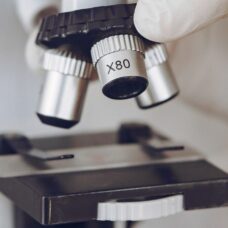Blog written by Edoardo Carnesecchi
In this recurring section “Drijfveren” scientists tell what motivates them to go against the current. In this edition we hear Edoardo Carnesecchi, who won the LUSH prize in 2020. Edoardo researches methods to test whether a substance, or a combination of different compounds, could be harmful, without using animals!

The LUSH prize is awarded yearly to promising young researchers by cosmetics brand LUSH. The brand is famous for their handmade, vegan cosmetics that are, above all, free from animal testing. In 2020 Edoardo Carnesecchi won the LUSH prize for his toxicology research. Edoardo is investigating animal-free ways to test if a substance of combination of compounds can be harmful for you. All the more reason for us to ask him more about his work and what drives him.
What motivates you in your research?
“I am Italian and I love food: yes, I know it’s a cliche. I’ve always been interested in understanding how safe the food is that we love to eat. That is why I enrolled in the course in Food Science & Technology. This made me realise I would like to better understand the toxicological mechanisms of chemicals we are exposed to in our daily life either through food or the environment (water, air, etc.). Hence, it was a logical step to start researching toxicology.
I am also interested in computer science and the endless possibilities it gives us, and how important it is in our lives. Because, let’s be honest, what can we do without computers? Just a few and primitive actions are possible: growing plants in the garden (if not installing a timer to water), brushing our teeth (if not using an electronic toothbrush) or simply walking around (if not jumping on a segway nor scooter).
The same applies to science: let’s only think of the usefulness of computers to analyse millions of data and share them via e-mail from Rome to Sydney with just one click!
I wondered why we used animals and not computers for safety testing. I was eager to apply computer technology to toxicology and develop innovative computer models in order to reduce and possibly replace animal testing.
My PhD project combines my two loves and focuses on development and testing innovative animal-free methods for ecological and human health risk assessment of chemicals and their mixtures. This is necessary since we are continuously exposed to thousands of chemicals. Some are of natural origin, others are made by man. All of these can potentially harm us or the environment.”
Edoardo: We urgently need to develop smart strategies that rely on animal-free methods.
Animal-free alternatives: fast, efficient and sustainable
“It is expected that chemical production will double globally by 2030. It is very important that we can test all these chemicals and find reliable results about whether they are potentially harmful.
To perform toxicity tests on animals for all chemicals and their potential (infinite) combinations occurring in the “real world” is rather impossible. This would require millions of live animals! It would also involve huge costs and lots of time for laboratory assays. And then I haven’t even mentioned the fact that animal tests aren’t always reliable, in addition to the ethical side of using animal tests.
We urgently need to develop smart strategies that rely on “animal-free methods” such as in silico tools (computer models). That’s why I believe that these methods and tools will enable the scientific community to perform chemical risk assessment in a more efficient, fast, sustainable and greener way in the future.”
Edoardo: Why don’t we try to develop new algorithms to better understand chemicals’ toxicity?
Scientists need to be more open, so that people understand better
“New approach methodologies rely less on animal testing: in silico (computers), in chemico (chemical) and in vitro (in the lab) tests. These will become more important in the near future.
There is a real barrier between scientists and citizens, who do not always understand scientific progress, while they do have the right to know about it. I believe it is very important for scientists to improve communication to the public and to increase transparency. Especially with difficult topics like artificial intelligence!
In this way we can help people understand the tremendous possibilities that animal free models have. They are more efficient, less expensive, sustainable and morally better.”

